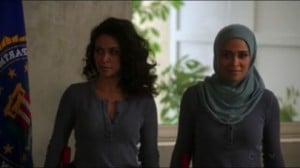BHUTTO is the definitive documentary that chronicles the life of one of the most complex and fascinating characters of our time. Hers is an epic tale of Shakespearean dimension. It’s the story of the first woman in history to lead a Muslim nation: Pakistan. –Synopsis from the film’s website
Duane Baughman and Johnny O’Hara’s 2010 documentary Bhutto, which recently aired on PBS’s Independent Lens in the United States, attempts to portray the “Shakespearean” life of Pakistani leader Benazir Bhutto in a two-hour-long film. The film intersperses interviews with her family members, journalists, friends, and political acquaintances alongside audio and video news clips and interviews with Benazir herself to narrate the story of Pakistan’s history and her rise to power.
Both the publicizing of the film and the film itself emphasize the underlying Orientalist theme that Muslim women “didn’t matter” (see the film’s trailer) in Pakistan, and that Benazir represented an exception to this. After a brief background on Pakistan’s political history and current country fact snapshots, Benazir describes her mother’s response to her birth:
My mother says nobody came to see her for three days when I was born because they were all in mourning that a girl had been born.
I found the interview snippets with Bhutto herself that were included in the film to be most compelling. Hearing in her own words, the film portrays her ambition to succeed as both a politician and as a woman in a couple of formative instances in her life was shaped by exchanges with her father:
I am what I am because I am Zulfikar Ali Bhutto’s daughter…It was my father who was against gender constraints of my time.
While at Harvard in the early 1970s, the women’s liberation movement also was a formative experience:
It was the first time I was in an environment where women were treated as full participants in society. It was that experience, perhaps more than anything else, that shaped my political being.
Granted, these snippets were selected by the filmmakers to include to portray Benazir in an overwhelmingly positive light, I nevertheless found the father-daughter bond and affinity for her education compelling, universal themes that transcend religious background. I wish the film had included more of her own personal insight.
Following her education at Harvard and Oxford in the 1970s, her father’s death, and her own politically-related incarceration, she asks for an arranged marriage while campaigning for what became her first term as prime minister (in Pakistan, people vote for the party, not the individual). Her American and British friends are shocked by her decision to have an arranged marriage. Tariq Ali recalls a conversation with Bhutto about soon-to-be husband Asif Ali Zardari: “He’s the only one who wanted to marry me.” Again, Orientalist themes start to rear their head again as one western attendee likens Benazir’s wedding to the “Arabian Nights” and another Pakistani journalist describes it as a “Bollywood”-style affair and not at all “elitist.”
Benazir is always striking in her appearance—in several of the images and video clips of her at political rallies in the film she stands out as a single, well-dressed woman leading a sea of men, dupatta expertly draped over a shalwar kamiz. The resemblance to the image of a sole woman among a crowd of men at a political rally from Shirin Neshat’s film Women Without Men is uncanny.
Throughout the film, Bhutto was beloved by her American and British friends and was seen, from their eyes, as a harbinger of democratic governance for Pakistan. Her depiction in the film, with swelling music and images from her political rallies and with her family, paints a positive portrayal of a striking, highly educated, pro-Western, highly upper-class Muslim family woman and largely dismisses any criticism about her. An interview snippet with her niece, Fatima, kept playing in my mind throughout the film: “Power was the end goal.”

I found myself wondering how her depiction might have differed had the film been directed by a Pakistani, or a woman, or had included interviews with Pakistanis she had worked alongside during her tenures as prime minister who were not related family members…
For a film entitled Bhutto, a considerable amount of time was spent on the political background and history of Pakistan. Her family’s influence on the nation’s political history is highly intertwined. But how did Benazir herself impact and contribute to political change in the country? To answer this question, the film again turns to an American friend to answer this question affirmatively and fleetingly; the lack of a Pakistani perspective is most noticeable in these instances. There are no explanatory snippets, here, from Benazir either.
Framing the film to a tired theme of “Muslim women don’t matter” and holding Benazir as the exception to this rule while largely ignoring the everyday experience of Pakistani women was disappointing. While Benazir stands out as an exceptional Muslim woman, it is also important to remember that she was human and had flaws. There are ambitious Muslim women around the world from a diverse array of socioeconomic backgrounds whose experiences in school and exchanges with their fathers help make them driven, successful women who make significant contributions to social change. These Muslim women exist and do matter.
Bhutto is available on DVD in the United States











